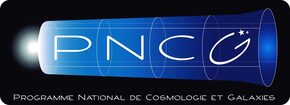Theory of Gravitation and Variation in Cosmology
Théorie de la gravitation et variations en cosmologie
12 – 16 April 2021
|
Scientific Committee
Comité scientifique Luc Blanchet (Institut d’Astrophysique de Paris) Thomas Buchert (Centre de Recherche Astrophysique de Lyon) Cédric Deffayet (Institut d’Astrophysique de Paris) Ruth Durrer (Université de Genève) Pedro Ferreira (University of Oxford) Nick Kaiser (ENS Paris) Peter Wolf (Observatoire de Paris) |
Organizing Committee
Comité d’organisation Brax Philippe (IPhT-CEA) |
On the behalf of the organizers
For more informations :
http://lpsc.in2p3.fr/index.php/fr/services/communication/evenements-actions-grand-public-scolaires-com-fr/lang-fr-archives-des-unes-lang-lang-en-previous-news-lang/66667059-hommage-a-cecile
|
This thematic school of CNRS aims to provide an overview of the most motivated current theories and tests of gravitation in different regimes, ranging from the scale of the solar system to that of the large structures of the Universe. The emphasis is on recent developments in connection with major current problems in cosmology, such as the origin of the acceleration of the expansion of the Universe. The topics covered are: gravitational waves, tests of gravity in the solar system, gravitation modified at very large scales and inhomogeneous cosmological models.
Main Topics Gravitational Waves (Observational data, the strong field tests of GR, the perspectives of new Physics) Tests in the solar system (Microscope and the equivalence principle, Ephemerides and new physics) Modified gravity (cosmological tests, fundamental theories like massive gravity) Inhomogeneous cosmology (Observational data, Theories) Audience The school is open to the international, it responds to a request from potential participants, such as CNRS researchers, academics and post-docs involved in this field. PhD students are also encouraged to attend: our future researchers. Prerequisite A doctoral level is required indifferently in Astronomy, Astrophysics, Theoretical Physics and Particle Physics. No preliminary upgrading is planned, but educational recommendations associated with the program will be passed on by speakers and will be posted on the school’s website. |
Cette école thématique du CNRS a pour vocation de donner un panorama des théories actuelles les plus motivées et des tests de la gravitation dans les différents régimes, allant de l’échelle du système solaire à celle des grandes structures de l’Univers. L’accent est mis sur les développements récents en lien avec les grands problèmes actuels en cosmologie, comme par exemple l’origine de l’accélération de l’expansion de l’Univers. Les thèmes abordés sont : les ondes gravitationnelles, les tests de la gravitation dans le système solaire, la gravitation modifiée aux très grandes échelles et les modèles cosmologiques inhomogènes.
Grands Axes Ondes Gravitationnelles (le point observationnel, les tests en champ fort de la RG, les perspectives de nouvelle physique) Tests dans le système solaire (Microscope et le principe d’équivalence, Éphémérides et nouvelle physique) Gravité modifiée (tests cosmologiques, théories fondamentales comme gravité massive) Cosmologie inhomogène (le point observationnel, les théories) Public concerné L’école est ouverte à l’international, elle répond à une demande de la part des participants potentiels, tel que les chercheurs CNRS, universitaires et post-doctorants impliqués dans ce domaine. Sont encouragés à s’inscrire également les doctorants : nos futurs chercheurs. Prérequis Il est requis un niveau doctoral indifféremment en Astronomie, Astrophysique, Physique Théorique et Physique des particules. Il n’est pas prévu de mise à niveau préliminaire, mais des recommandations pédagogiques associées au programme seront transmises par les intervenants et figureront sur le site web de l’école. |
Julian Adamek (Institute for Computational Science) Relativistic Simulations for Cosmology
Luca Amendola (University of Heidelberg) Model-independent cosmology
Enrico Barausse (Scuola Internazionale Superiore di Studi Avanzati) Gravitational waves from compact binaries: physics and astrophysics
Joël Bergé (ONERA, Université Paris Saclay) Gravitation under (the) MICROSCOPE
Luc Blanchet (CNRS Institut d’Astrophysique de Paris) Theory of gravitational waves and approximation methods in general relativity
Camille Bonvin (University of Geneva) Relativistic effects in large-scale structure
Françoise Combes (Observatoire de Paris) The dark matter puzzle
Giulia Cusin (Université de Genève) Cosmological effects in waveform modeling
Patrick Iglesias-Zemmour (The Hebrew University of Jerusalem) General Covariance as General Relativity Principle, the Mathematical Foundation
Martin Kunz (University of Geneva) A brief introduction to Euclid and what we can learn from it
Federico Piazza (Aix Marseille Université) Effective field theories of cosmic acceleration
Andrew Tolley (Imperial College London) A brief introduction to Massive Gravity
Alexander Vikman (Central European Institute for Cosmology and Fundamental Physics) The Enigma of Dark Energy
Talks
Asta Heinesen (ENS Lyon) Frameworks for model-independent data analysis in cosmology
Hayley Macpherson (University of Cambridge) Numerical relativity as a tool to study inhomogeneous cosmology
Johannes Noller (University of Portsmouth) Testing gravity across all scales
Pratyush Pranav (Centre de Recherche Astrophysique de Lyon) Topological data analysis for cosmology: theory and applications
Alessandra Silvestri (Leiden University) Testing Gravity and Dark Energy on Cosmological scales
George Zahariade (Institut de Fisica d’Altes Energies) Quantum Mechanics of Gravitational Waves
Short talks
Francesco Gozzini (Aix-Marseille Université) A cosmological vacuum state from spinfoam gravity
Caroline Guandalin (University of São Paulo) Relativistic features in large-scale structure surveys: multipoles of the power spectrum
François Larrouturou (Institut d’Astrophysique de Paris) The Minimal Theory of Bigravity
Syed Umair Naqvi (Jagiellonian University) Freely falling bodies in a standing wave space-time
Olivier Rousselle (Sorbonne Université) How does antimatter fall ?: focus on GBAR experiment (CERN)
Lintao Tan (University of Florida) Quantum Gravitational Corrections to Gravity during Inflation
Zoha Tariq (University of the Punjab) Structure Scalars and their evolution for massive objects in f(R) gravity
Léo Vacher (Institut de recherche en astrophysique et planétologie (IRAP)) Astrophysical and local constraints on string theory: runaway dilaton models








